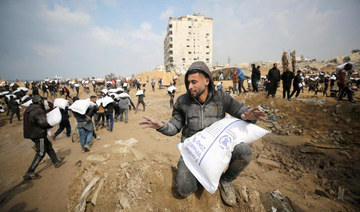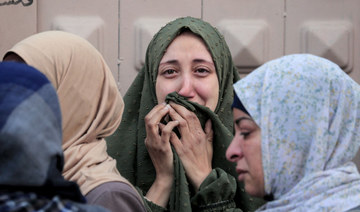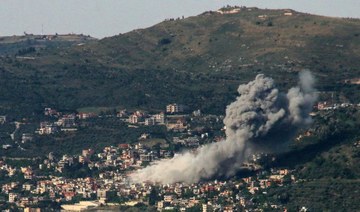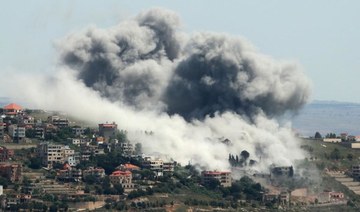GAZA STRIP, Palestinian Territories: Envoys pushed on with efforts for a Gaza truce and hostage release deal in Cairo talks Wednesday, hoping to halt nearly five months of fighting with days to go before Ramadan.
US President Joe Biden had urged Hamas to accept a ceasefire plan with Israel before the Muslim fasting month begins, which could be as early as Sunday depending on the sighting of the crescent moon.
As negotiators in Egypt sought to overcome tough stumbling blocks, deadly fighting again rocked Gaza where the UN warns famine looms and desperate crowds have stopped and looted food aid trucks.
Gazans were waiting to collect bags of flour outside an office of the UN agency for Palestinian refugees, UNRWA, in Rafah, now home to nearly 1.5 million Palestinians, most of them displaced by the war.
“The flour they provide is not enough,” said displaced man Muhammad Abu Odeh. “They do not provide us with sugar or anything else except flour.”
In Khan Yunis, dozens of people went to inspect their homes before streaming out along streets lined by bombed-out buildings carrying what belongings they could recover after Israeli forces pulled out of the city center, an AFP correspondent said.
The army has yet to respond to an AFP request to confirm such a withdrawal.
Biden on Tuesday called on Hamas to accept the truce plan brokered by US, Qatari and Egyptian mediators, saying “it’s in the hands of Hamas right now.”
The proposed deal would pause fighting for “at least six weeks,” see the “release of sick, wounded, elderly and women hostages” and allow for “a surge of humanitarian assistance,” the White House said.
One known sticking point centers on an Israeli demand for Hamas to provide a list of about 100 hostages believed to still be alive — a task Hamas says it is unable to complete while bombing continues.
The Palestinian Islamist group said in a statement it had “shown the required flexibility with the aim of reaching an agreement,” insisting on a complete halt to the fighting.
In past years, violence has flared during Ramadan in annexed east Jerusalem’s Al-Aqsa mosque compound — Islam’s third-holiest site and Judaism’s most sacred, known to Jews as the Temple Mount.
Hamas has urged Muslims to flock there in great numbers, as they do every year, while some Israeli far-right politicians have urged restrictions.
Israel has said Muslims will initially be allowed into the site “in similar numbers” as in recent years, but that this will be followed by a weekly “situation assessment.”
The war began after Hamas launched the October 7 attack on southern Israel that resulted in about 1,160 deaths, most of them civilians, according to an AFP tally based on official Israeli figures.
The militants also took around 250 hostages, and Israel believes 99 of them remain alive in Gaza and that 31 have died.
Israel’s retaliatory offensive has killed at least 30,717 people, mostly women and children, according to the Gaza health ministry.
Israeli Prime Minister Benjamin Netanyahu has vowed to push on with the campaign to destroy Hamas, before or after any truce deal.
The Israeli army said Wednesday it lost one more soldier in Gaza, taking the total killed to 247 since ground operations began on October 27.
While the war has reduced vast stretches of Gaza to a wasteland of gutted buildings and rubble, the siege has sparked a humanitarian disaster for its 2.4 million people.
Hunger has reached “catastrophic levels” in the north, the UN World Food Programme has warned.
“Children are dying of hunger-related diseases and suffering severe levels of malnutrition,” it said, with the latest victim according to the health ministry being a 15-year-old girl who died at Gaza City’s Al-Shifa Hospital.
Health ministry spokesman Ashraf Al-Qudra said “the famine in northern Gaza has reached lethal levels” and could claim thousands of lives unless Gaza receives more aid and medical supplies.
South Africa on Wednesday petitioned the International Court of Justice to impose more emergency measures against Israel over what it described as the “widespread starvation” occurring in Gaza as a result of its offensive.
It is the second time Pretoria has asked the court for additional measures — its first request in February was denied.
British foreign minister David Cameron on Wednesday pressed Israel to increase the flow of aid into Gaza.
“We are still not seeing improvements on the ground. This must change,” Cameron said he told Israeli war cabinet member Benny Gantz during a meeting.
More than 100 people were reported killed in bloody chaos last week when thousands of people swarmed aid trucks. Gaza officials blamed the deaths on Israeli gunfire, while the army insisted most were trampled or run over.
Another truck convoy was diverted by Israeli troops within Gaza late Tuesday and then stopped by “a large crowd of desperate people who looted the food,” said the WFP.
Jordanian, US and other planes have repeatedly airdropped food into Gaza.
But WFP deputy chief Carl Skau said “airdrops are a last resort and will not avert famine.”
Israel, which has recalled its UN envoy in a sign of growing tensions, said the Security Council should “designate Hamas immediately as a terrorist organization” and impose sanctions on it.
Government spokesman Eylon Levy also demanded “a fierce condemnation” of sexual violence committed during the Hamas attack, after a UN report found “reasonable grounds to believe” there had been instances of rape on October 7.
Envoys push for Gaza truce before Ramadan starts next week
https://arab.news/mgzua
Envoys push for Gaza truce before Ramadan starts next week
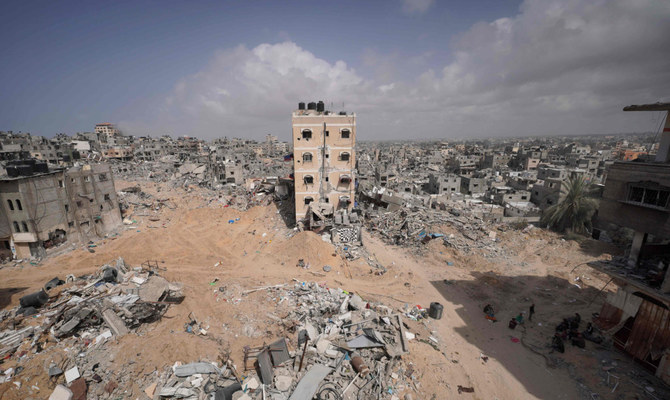
- As negotiators in Egypt sought to overcome tough stumbling blocks, deadly fighting again rocked Gaza where the UN warns famine looms
Israeli forces repeatedly target Gaza aid workers, says Human Rights Watch

- They are among more than 250 aid workers who have been killed in Gaza since the war erupted more than seven months ago, according to UN figures
- Israel has killed more than 35,000 Palestinians in Gaza, mostly women and children, according to the health ministry in the Hamas-run territory
JERUSALEM: Human Rights Watch said on Tuesday that Israel had repeatedly targeted known aid worker locations in Gaza, even after their coordinates were provided to Israeli authorities to ensure their protection.
The rights watchdog said that it had identified eight cases where aid convoys and premises were targeted, killing at least 15 people, including two children.
They are among more than 250 aid workers who have been killed in Gaza since the war erupted more than seven months ago, according to UN figures.
In all eight cases, the organizations had provided the coordinates to Israeli authorities, HRW said.
This reveals “fundamental flaws with the so-called deconfliction system, meant to protect aid workers and allow them to safely deliver life-saving humanitarian assistance in Gaza,” it said.
“On one hand, Israel is blocking access to critical lifesaving humanitarian provisions and on the other, attacking convoys that are delivering some of the small amount that they are allowing in,” Belkis Wille, HRW’s associate crisis, conflict and arms director, said in Tuesday’s statement.
HRW highlighted the case of the World Central Kitchen, a US-based charity who saw seven of its aid workers killed by an Israeli strike on their convoy on April 1.
This was not an isolated “mistake,” HRW said, pointing to the other seven cases it had identified where GPS coordinates of aid convoys and premises had been sent to Israeli authorities, only to see them attacked by Israeli forces “without any warning.”
EU top diplomat sees US ‘fatigue’ in Mideast

- Josep Borrell strongly criticized Israel’s war campaign, saying Gazans were ‘dying and starving and suffering in unimaginable proportions’ and that it was a ‘man-made disaster’
- Josep Borrell: ‘I see a certain fatigue from the US side to continue engaging in looking for a solution’
On a visit to California, the bloc’s foreign policy chief Josep Borrell again strongly criticized Israel’s war campaign, saying Gazans were “dying and starving and suffering in unimaginable proportions” and that it was a “man-made disaster.”
“I see a certain fatigue from the US side to continue engaging in looking for a solution,” Borrell said in a speech Monday at Stanford University that was publicly released on Tuesday.
“We are trying to push with the Arab people in order to build together, the Arabs and Europeans, to make this two-state solution a reality,” he said in English.
US Secretary of State Antony Blinken has made seven trips to the Middle East since the unprecedented October 7 attack on Israel by Hamas which prompted a relentless Israeli military campaign in Hamas-ruled Gaza.
He has nudged Israel to allow in more aid, pushed against a regional escalation and pleaded for Israel to accept a two-state solution as part of a broader eventual deal that includes normalization with Saudi Arabia.
But the United States vetoed a Security Council bid to give Palestine full UN membership, arguing that statehood can only come though negotiations that address Israel’s security concerns.
The General Assembly last week passed a symbolic vote for Palestinian membership with the United States one of only nine countries to vote against.
The others opposed included two European Union members — the Czech Republic and Hungary. Among EU heavyweights, France voted in favor and Germany abstained.
Borrell acknowledged that the vote showed the European Union was “very much divided” over Gaza, unlike on the Ukraine war, and cited “historical reasons.”
“But it doesn’t mean that we don’t have to take a stronger part of responsibility because we have delegated (to) the US looking for a solution,” he said.
Borrell, a former Spanish foreign minister, in February sharply criticized the US arms flow for Israel, pointing to President Joe Biden’s own words that too many people were dying in Gaza.
Biden last week for the first time threatened to cut military aid to Israel, with one shipment of bombs already halted, if Israel defies US warnings and assaults the packed city of Rafah.
‘Nothing wrong’ with Gaza death toll figures

- Israel has killed more than 35,000 Palestinians, according to Gaza’s Health Ministry
GAZA STRIP: The World Health Organization voiced full confidence in Gaza Ministry of Health death toll figures on Tuesday, saying they were actually getting closer to confirming the scale of losses after Israel questioned a change in the numbers.
Gaza’s Health Ministry last week updated its breakdown of the total fatalities of around 35,000 since Oct. 7, saying that about 25,000 of those have so far been fully identified, of whom more than half were women and children.
This sparked allegations from Israel of inaccuracy since Palestinian authorities had previously estimated that more than 70 percent of those killed were women and children.
UN agencies have republished the Palestinian figures, which have since risen above 35,000 dead, citing the source.
“Nothing wrong with the data, the overall data (more than 35,000) are still the same,” said WHO spokesperson Christian Lindmeier at a Geneva press briefing. “The fact we now have 25,000 identified people is a step forward,” he added.
Based on his own extrapolation of the latest Palestinian data, he said that around 60 percent of victims were women and children, but many bodies buried beneath rubble were likely to fall into these categories when they were eventually identified.
He added that it was “normal” for death tolls to shift in conflicts.
“We’re basically talking about 35,000 people who are dead, and really every life matters, doesn’t it?” Liz Throssel, spokesperson for the UN human rights office, said at the same briefing. “And we know that many and many of those are women and children and there are thousands missing under the rubble.”
Lebanon state media says Israel strike kills two

- The enemy drone strike that targeted a car on the Tyre-Al-Hush main road martyred two people
BEIRUT: Lebanon’s state-run news agency said an Israeli drone strike on a car in the country’s south killed two people on Tuesday evening.
Israel and Hamas ally Hezbollah have exchanged near-daily fire following the Palestinian group’s October 7 attack on southern Israel that sparked war in Gaza.
“The enemy drone strike that targeted a car on the Tyre-Al-Hush main road martyred two people,” the National News Agency said, also reporting that ambulances had headed toward the site of the strike.
At least 413 people have been killed in Lebanon in seven months of cross-border violence, mostly militants but also including 79 civilians, according to an AFP tally.
Israel says 14 soldiers and 10 civilians have been killed on its side of the border.
Tens of thousands of people have been displaced on both sides.
Hostages’ plight casts pall over Israel’s Independence Day

- The more than seven-month war in Gaza and the absence of the remaining hostages have cast a long shadow over the normally joyous day
- “Like in Pesach (Jewish Passover), I didn’t feel it’s really a holiday of liberation,” Lavi Miran added
TEL AVIV: On Israel’s 76th Independence Day, victory feels far away for many agonizing over the fate of dozens of hostages still held in the war-ravaged Gaza Strip.
“On one side we’re still here, my daughters are still here, my family’s still here, and Israel is still here,” said Lishay Lavi Miran, from the Nir Oz kibbutz community, less than a kilometer (0.62 miles) from the Gaza border.
“But it’s not really independence because... Omri is over there,” added the 39-year-old, referring to her husband who was kidnapped and taken to the Palestinian territory on October 7 alongside about 250 other hostages.
He is among 128 captives who remain in Gaza, 36 of whom the army says are dead.
On May 14 every year, Israelis celebrate the anniversary of their state’s creation.
But the more than seven-month war in Gaza and the absence of the remaining hostages have cast a long shadow over the normally joyous day.
“Like in Pesach (Jewish Passover), I didn’t feel it’s really a holiday of liberation. I don’t feel now that there is really something to be happy about,” Lavi Miran added.
Batia Holin, from the neighboring kibbutz community of Kfar Aza, expressed similar feelings, saying “there is no independence here.”
Several Kfar Aza residents are still captive in Gaza.
Holin and other residents of the southern Israeli communities surrounding the border with Gaza have been evacuated since the October 7 Hamas attack.
“Even though I am in my country, I cannot be in my home and I will not be able to return for at least three years,” Holin, 71, said. “What kind of independence is this?“
And in northern Israel, where there have been a regular exchange of fire between Israeli forces and Lebanon’s Hezbollah, tens of thousands have been displaced.
“They can’t go home and have become refugees,” lamented Holin.
The unprecedented October attack saw militants surge through Gaza’s militarised border and resulted in the deaths of more than 1,170 people, mostly civilians, according to an AFP tally of official Israeli figures.
Israel responded with a relentless military campaign in the Hamas-run territory that has so far killed more than 35,100 people, according to the Gaza health ministry.
Israel is “a sovereign country where its citizens are refugees... It’s terrible,” Holin continued, recalling a brief return home to the community where more than 60 people were killed. She shut the door and left.
“That’s it. I don’t have a home anymore.”
Israel was founded in 1948 on the vow of a “Jewish national home” with the promise of safety to Jews, six million of whom were murdered during the Holocaust.
Based on this promise, many migrated to the newly formed state, including Lavi Miran’s grandparents who arrived from Libya and Azerbaijan.
For Palestinians, that period is known as the “Nakba,” or catastrophe, marked on May 15 every year to commemorate the mass displacement of around 760,000 Palestinians during the war that accompanied Israel’s creation.
During the Hamas attack, fighters ransacked Lavi Miran’s home “and took a lot of things. Even after seven months, I can’t touch stuff over there,” she said.
“They trashed all the house. They threw all of our clothes.”
But to her, the priority remains the return of the hostages. She has joined the regular protests by thousands calling on the Israeli government to reach a deal that would bring them back.
On Sunday, during a ceremony marking Memorial Day to commemorate fallen soldiers and civilian victims of attacks on Israel, army chief Herzi Halevi acknowledged he was “fully responsible” for the events of October 7.
“Hamas won the war, because they’re not here,” said Lavi Miran, referring to the hostages.
“Home, it’s just when he comes back,” she continued, referring to her husband Omri, a 47-year-old massage therapist.
“It’s like a nightmare. They’re in hell.”



